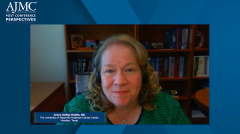
SOGUG-AUREA Trial Results Impacting Next-Steps for Bladder Cancer Treatment
Dr Siefker-Radtke shares takeaways from the SOGUG-AUREA study and its influence on treatment for patients with urothelial cancer.
Episodes in this series

Arlene Siefker-Radtke, MD: We often look at discontinuation rates when we consider the toxicity of these [treatment] strategies. What we’re seeing from atezolizumab [Tecentriq] and split-dose cisplatin in this trial is that the majority of patients come off treatment due to progressive disease or lack of clinical activity, which is very common with systemic chemotherapy agents. It also doesn’t appear that this combination is contributing to additional toxicity. At the moment, the split-dose cisplatin trial tells us that we can use split-dose cisplatin safely. We see clinical activity with good objective response rates. It’s still too early to tell if the survival is going to be similar to cisplatin-based regimens or more closely relevant to carboplatin-based regimens. I look forward to seeing further follow-up from this trial to give us a more definitive end point on what the survival is in this patient cohort.
I’m also asked, “Where should we go next with this SOGUG-AUREA trial with gemcitabine-cisplatin with or without atezolizumab?” The split dose is a very attractive option for patients with borderline kidney function, and one that I’ll continue to utilize in my patients with bladder cancer. But whether to incorporate atezolizumab remains an unanswered question. To do this with the current trial would take a larger randomized phase 3 clinical trial. Personally, I’d wait to see if we have further follow-up from the atezolizumab frontline trial suggesting whether it meets an overall survival end point as the imprimatur of whether we should give atezolizumab with systemic chemotherapy. With the available trials, we’ll have enough data to tell us whether we should ever consider giving split-dose cisplatin with an immune checkpoint inhibitor.
Transcript edited for clarity.
Newsletter
Stay ahead of policy, cost, and value—subscribe to AJMC for expert insights at the intersection of clinical care and health economics.









